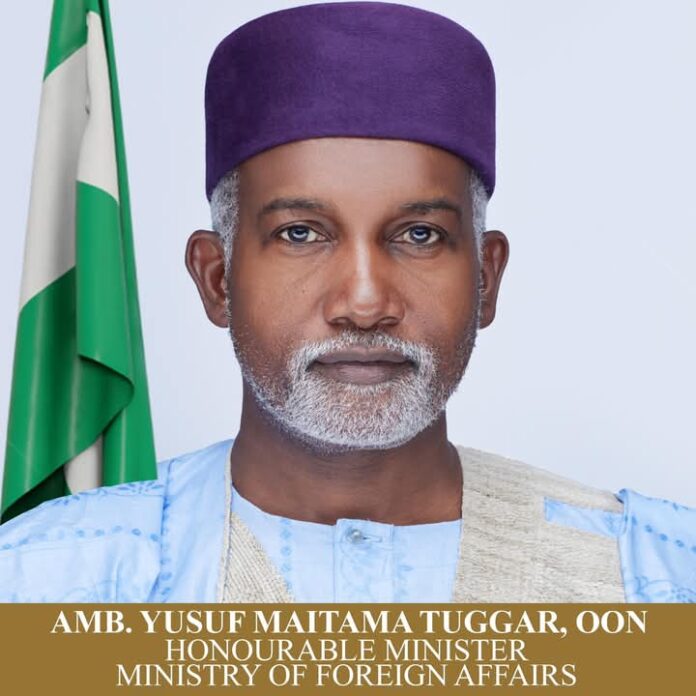By: Daure David
The recent denial of visas to Nigeria’s security chiefs by the Canadian Embassy has sent shockwaves through the country, raising concerns over Nigeria’s standing in the international community. This diplomatic embarrassment is a clear indication that our foreign policy under the leadership of Minister of Foreign Affairs, Yusuf Maitama Tuggar, has hit a roadblock. The incident, alongside Nigeria’s dwindling influence within ECOWAS, warrants urgent reflection on the effectiveness of Tuggar’s approach to managing the country’s foreign relations.
When Yusuf Maitama Tuggar was appointed to head Nigeria’s Ministry of Foreign Affairs, many had high hopes for an individual with a strong academic background in International Relations from the United States. His expertise was expected to guide the country’s diplomatic efforts, particularly in these challenging times when Nigeria faces security threats, economic instability, and an image problem on the global stage.
However, under his watch, Nigeria has seen a series of diplomatic missteps. ECOWAS, once a strong regional bloc, lost three of its members during Tuggar’s tenure, a sign of diminishing Nigerian influence in the region. But it is the recent visa denial that has truly put Nigeria’s foreign relations in the spotlight for all the wrong reasons. The fact that key security officials, including the National Security Adviser, were denied entry into Canada is not just a personal embarrassment; it is a national disgrace.
While the denial of visas could be seen as a minor incident in the eyes of some, it reflects deeper issues within our foreign policy framework. Canada’s actions, which many view as disrespectful, require a clear and decisive response. Yet, Tuggar has remained largely silent on the matter, allowing the issue to fester. His failure to take immediate action—such as summoning the Canadian Ambassador to Nigeria for an official explanation—has left many questioning his ability to effectively represent the country’s interests.
Sule Lamido, a former governor and respected political figure, recently expressed concerns over the lack of coordination between Nigeria’s security and foreign policy apparatus. His comments resonate strongly when one considers the ongoing issues in the country: diplomatic embarrassment, security challenges, and the overall sense that Nigeria’s leadership is not speaking with one voice on the global stage. The NSA’s failure to communicate effectively and Tuggar’s reluctance to engage on this diplomatic setback have caused significant harm to Nigeria’s reputation.
At a time when Nigeria needs strong, proactive leadership in its foreign affairs, Minister Tuggar seems distracted, focusing more on local political squabbles—such as his ongoing disputes with Governor Bala Mohammed—rather than addressing the country’s global standing. This negligence is more than just a failure of foreign diplomacy; it is a failure to protect Nigeria’s national interests.
Foreign policy is not just about grand statements or media appearances. It is about quiet, behind-the-scenes work that ensures that Nigeria’s voice is heard, its rights are respected, and its interests are safeguarded. Tuggar’s silence in the face of the Canadian visa denial is indicative of a broader issue of disengagement that could have long-term consequences for the country. At a time when the world is watching, Nigeria cannot afford to let such issues slide under the radar.
It is not too late for the Minister of Foreign Affairs to step up and prove that he is capable of handling Nigeria’s complex international relations. He must take swift action, beginning with engaging the Canadian Embassy and sending a strong message that such disrespect will not be tolerated. Additionally, he should reflect on Nigeria’s regional role and work to restore its influence in ECOWAS.
Nigeria needs a foreign policy leader who is both vocal and strategic, someone who can not only navigate the complexities of international relations but also maintain the country’s dignity and respect on the world stage. Tuggar has the credentials, but whether he has the will and the focus to carry out this important role remains to be seen.
The ball is now in his court, and the time for action is long overdue.







